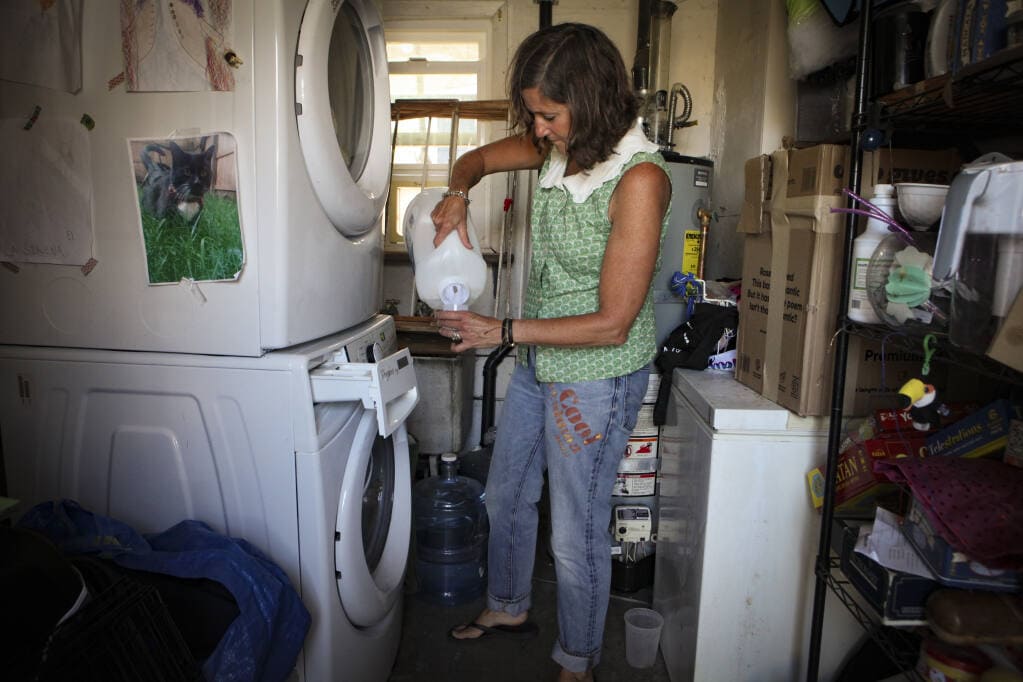Water conservation efforts in Petaluma appear to be working, according to the latest data from the California State Water Resources Control Board.
Water users in the city of Petaluma reduced their usage by 34.3% in June, making it the sixth greatest conserving area in the state, and No. 1 in the San Francisco Bay hydrologic area which is made up of portions of the nine-county Bay Area that drain into San Francisco Bay, according to data released by the state’s water board.
In June, water users in Petaluma used 72 gallons daily per capita, which was down from 80 gallons in June 2021 and 93 gallons in June 2020. In Sonoma County, the city of Healdsburg narrowly outpaced Petaluma in its water conservation totals, with a 34.6% reduction in June.
The highest rate of reduction from a water supplier in the state, Bella Vista Water District in Shasta County, saw a 39.6% reduction.
Petaluma water department’s environmental services analyst Chelsea Thompson said much of the reduction has stemmed from the latest water restrictions.
“I would say it’s a combination of our efforts and local leadership, also our robust outreach campaign,” Thompson said, “which has had a lot of residents come on board with conserving water and they have been really good.”
Two months after the state water board reported in March 2021 that 95% of California was experiencing drought, and that water users should prepare for impacts, the city implemented Stage 1 of its 2020 Water Shortage Contingency Plan, which encouraged voluntary water conservation.
On June 14, 2021, the state water board required Sonoma County Water Agency’s contractors, which includes Petaluma, to reduce total diversions from the Russian River by 20% to protect reservoir levels. To meet that reduction, the city implemented Stage 3 of its contingency plan that required a mandatory 25% reduction of water by those using the city’s public water system.
The city then moved to Stage 4 in September 2021, which required a mandatory 30% reduction.
Petaluma requires higher rates of water reduction than other municipalities in the county. Santa Rosa, for example, requires a mandatory 20% reduction in water use. Petaluma’s conservation measures include the allowance of irrigation only two days a week as Santa Rosa limits irrigation of landscapes daily from the hours of 8 p.m.-6 a.m.
Andrea Rodriguez, communications manager at the Sonoma County Water Agency, said the utility is appreciative of everyone doing their part and recognizes the difficulty of another year in a drought.
“I really see how our residents and cities are thinking about water in a different way,” Rodriguez said. “And making those choices to put the programs and infrastructures in place for the long-term.”
The city is also focused on its recycled water program.
Last week, the U.S. Bureau of Reclamation announced grant awardees of the North Bay Water Reuse Authority for the Title XVI Reuse Program. A collaborative effort between the city of Petaluma, Sonoma Water and the North Bay Water Reuse Authority has resulted in an estimated $6,934,655 awarded for Petaluma water projects.
This will fund three city projects, one of which is upgrades to the Ellis Creek Water Recycling Facility to increase its daily capacity by another 2.12 million gallons of water.
Rodriguez said the city is considering the future when planning such projects and understands the reality of living in a drought.
“Petaluma is one of the first to really develop and build up their recycling water program,” she said. “This is where the city is reinvesting back to their agriculture and making it part of the infrastructure.”
Liz Platte-Bermeo, climate resilience programs manager at Daily Acts, said the nonprofit has seen a lot of community support with conservation efforts.
“Everything is interconnected, and I think nowadays I’m seeing a lot more people really recognize that and try to make change in any way they can ― no matter how big or small,” she said.
Daily Acts works with communities to inspire and advise on transformative actions for climate resilience through educational programs and free consulting on do-it-yourself, low-cost and low-technology solutions.
“People are tuned in to our water resources. We have so many different models, gardens and opportunities for water reuse, from public sites to city sites, people are able to see what’s possible through our city and county demonstrating certain techniques,” Platte-Bermeo said. “I think with state funding and emphasis on climate emergency and crisis, people are starting to wake up to it a lot more.”
Platte-Bermeo said she has witnessed a sense of responsibility from the local community when it comes to conserving water, and following the city’s restrictions.
Water reduction efforts have included limiting outdoor watering and equipping hoses with special hose-end nozzles. Some of the latest restrictions implemented by the city’s contingency plan include a prohibition of filling new pools or spas and installation of new landscapes or replanting existing ones that require water, along with the operation of ornamental water fountains in the city.
Nonprofit Cool Petaluma is partnering with Daily Acts to further encourage sustainable solutions for the community. Cool Petaluma Campaign Director Natasha Juliana said the two organizations are working to facilitate rainwater catchment systems and gray water systems.
Gray water refers to recycled water from household use, often used for landscape irrigation. These systems offer a convenient way to collect and reuse water from bathtubs, showers, washing machines and sinks.
“The city had a water conservation table at our Cool Petaluma Expo at Lagunitas and was impressed with the 100-plus highly-engaged people they were able to talk to,” Juliana said. “We worked with the city to create a form for our Cool Petaluma participants to easily request free water-saving devices.”
Their Cool Block teams collaborate on larger water conservation projects, such as the Mulch Madness program to sheet mulch lawns.
“To date, Cool Block participants have taken 659 water-related actions and have pledged to take another 799 water-related actions,” Juliana said.
To report water waste in Petaluma, call 707-778-4507 or email [email protected].



